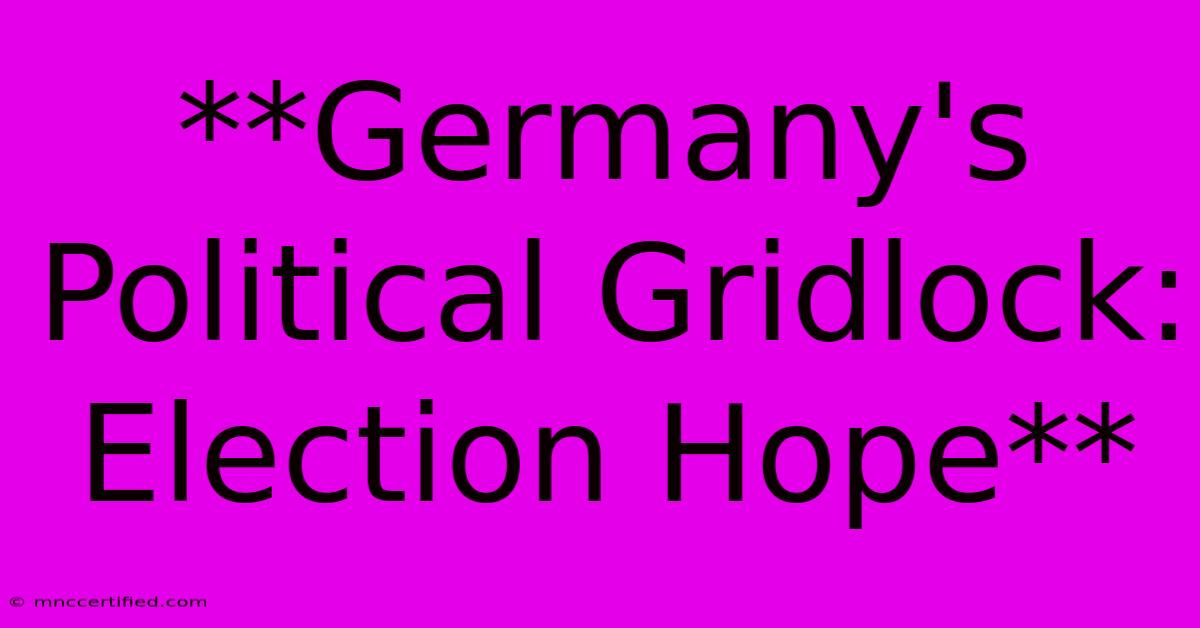**Germany's Political Gridlock: Election Hope**

Table of Contents
Germany's Political Gridlock: Election Hope on the Horizon?
Germany, known for its stability and economic strength, has found itself in a period of political gridlock. The 2021 federal election resulted in a fragmented Bundestag, with no single party securing a majority. This has led to a complex coalition negotiation process, leaving many wondering if Germany can overcome its political impasse.
The Fragmented Landscape: A New Era in German Politics
The 2021 election marked a significant shift in German politics. The once dominant Christian Democratic Union (CDU) and its Bavarian sister party, the Christian Social Union (CSU), experienced a decline in support, while the Social Democratic Party (SPD) emerged as the largest party. However, the Green Party and the Free Democratic Party (FDP) also gained significant seats, adding further complexity to the political landscape.
This fragmentation has created a challenging situation for forming a stable government. Traditional alliances, like the "Grand Coalition" between the CDU/CSU and SPD, have lost their appeal. Instead, a three-party coalition, known as a "traffic light coalition" due to the colors of the involved parties (SPD-red, Greens-green, and FDP-yellow), is currently being negotiated.
The Challenges of Coalition Negotiations: A Difficult Road Ahead
The coalition negotiations have been marked by intense discussions and compromises. The parties have divergent views on crucial issues like climate change, economic policy, and social welfare. Finding common ground on these issues is essential for establishing a stable government.
The major points of contention include:
- Climate Change: The Green Party advocates for ambitious environmental policies, while the FDP is more focused on economic growth and individual freedoms.
- Social Welfare: The SPD prioritizes social justice and expanding social programs, while the FDP favors market-oriented solutions and fiscal responsibility.
- Economic Policy: The FDP supports tax cuts and deregulation, while the SPD and Greens are more inclined towards government intervention in the economy.
The successful formation of a coalition hinges on finding a balance between these contrasting positions.
Hope for a Stable Future: Can Germany Overcome Gridlock?
Despite the challenges, there is hope for a successful resolution. The parties involved are committed to finding a way forward, driven by the need to address critical issues facing the country. The current negotiations, while complex, are a testament to Germany's democratic institutions and the willingness of its political leaders to find common ground.
Here's why the hope remains:
- Shared Interests: Despite their differences, all parties recognize the need for a stable government capable of addressing pressing issues like climate change, economic recovery, and social cohesion.
- Experienced Negotiators: The leaders of the involved parties are experienced politicians who have navigated complex coalitions in the past.
- Public Pressure: The German public expects a stable government capable of delivering on its promises. This pressure will likely push the parties towards compromise.
Looking Ahead: A New Chapter for German Politics
The ongoing coalition negotiations are a defining moment for German politics. The outcome will shape the country's future direction and its ability to navigate the challenges of the 21st century. While the process has been challenging, the prospect of a stable and effective government based on compromise and collaboration remains a beacon of hope for Germany.
This period of political gridlock may ultimately lead to a stronger and more representative government, one that reflects the diversity of views and priorities within German society. The outcome of the negotiations will undoubtedly be a defining moment for German politics, setting the stage for the next chapter in the country's history.

Thank you for visiting our website wich cover about **Germany's Political Gridlock: Election Hope**. We hope the information provided has been useful to you. Feel free to contact us if you have any questions or need further assistance. See you next time and dont miss to bookmark.
Featured Posts
-
Review The Day Of The Jackal Tv Series 2024
Nov 08, 2024
-
Watch Manchester United Vs Paok Live Europa League
Nov 08, 2024
-
Does A Glass Claim Affect Your Insurance
Nov 08, 2024
-
Event Cancellation Insurance Limitations
Nov 08, 2024
-
Appendicitis Surgery Cost With Insurance
Nov 08, 2024